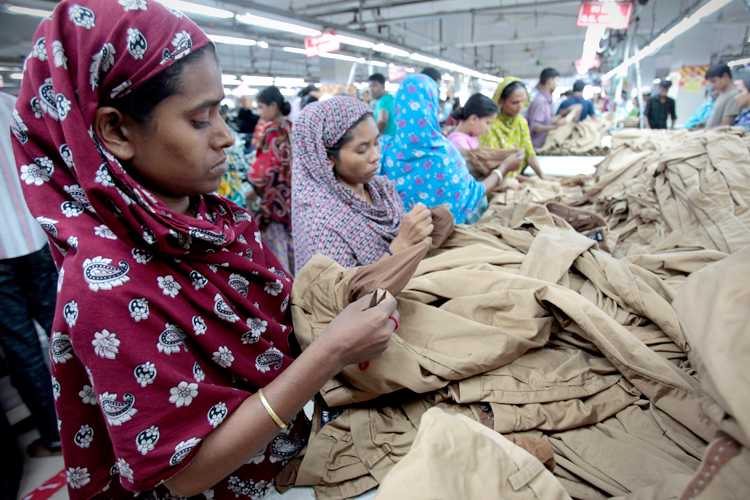Following weeks of sustained strikes and protests in Bangladesh – site of unparalleled cheap labor costs and recent deadly industrial disasters – Reuters this week reported that the garment industry expects a minimum wage increase of at least 50 percent. But an advocate working with Bangladesh activists – who have been repeatedly jailed for their efforts – says that news is less hopeful than it appears, and that the key decision-maker will be the western retailers like Gap and Wal-Mart that profit from Bangladeshi poverty.
“It’s not what workers need. It’s not what they expect. It’s not what they deserve…” said Scott Nova, who directs the Workers Rights Consortium, a DC-based monitoring organization whose board includes representatives of students, university administrations, and labor groups. “It’s likely to lead to more anger and more protest.” Noting that the minimum is currently the equivalent of 18 U.S. cents an hour, Nova said that while a 50 percent raise,“might be viewed as very substantial, in the Bangladesh context, it is not.”
Reuters’ Shymantha Asokan reported that strikes “hit nearly a fifth of workshops” in September. Nova said he was struck by Bangladesh workers’ “extraordinary courage,” given that they faced not only the risk of being fired but also a documented history of violent suppression by the country’s government, from “the jailing and torture” of leading activists, to “a very heavy-handed industrial police force that routinely physically assaults workers – even when they’re engaged in peaceful protest – using batons and rubber bullets.” Following the suspicious 2013 disappearance and death of activist Aminul Islam, whose body appeared to have been tortured, his colleague Kalpona Akter told me, “They have killed him. But they also give us a message, that nobody is safe here now…We don’t know who is next.”
The WRC head described such repression as one manifestation of the Bangladesh government’s close collaboration with the country’s garment industry – so close that “you can’t even completely view the industry and the government as two separate entities.” He contended that their strategy, which has made Bangladesh the world’s second biggest apparel exporter after China by keeping wages the cheapest on the globe, has “built in an inherent destabilizing factor,” because “there is only so much abuse that human beings will take.” Nova told Salon that the government’s approach was proving to be “neither a morally defensible nor a practically defensible strategy for much longer,” given both the ongoing protests and the international outrage over the deaths of 1,200-some workers in factory fire last November and a building collapse in April.
“I jumped not to save my life,” Sumi Abedin, who jumped from the third floor of the Tazreen Factory during the fire, told me through a translator last spring. “I jumped to save my body. Because if I would be in the factory, my parents would not be able to get my body. I would be burned to death. So I jumped so at least they could find my body inside.”
As I’ve reported, many European retailers agreed in recent months to join a labor-backed accord designed to avert future such disasters. Rather than joining them, top U.S. companies, led by Wal-Mart and the Gap, worked with the D.C.-based Bipartisan Policy Center to create an alternative safety group which Nova and others slammed as bereft of meaningful enforcement.
Asked for comment on the potential wage increase, Wal-Mart Senior Director for International Corporate Affairs Kevin Gardner referred Salon to his comment to Reuters: that the company “continues to work with other stakeholders in encouraging the Bangladesh government to review minimum wages for workers in the garment industry to ensure worker needs are met.”
Nova told Salon that any hope for major improvements in Bangladesh wage standards and safety regulations “depends on the willingness of brands and retailers to behave responsibly, and not to punish Bangladesh for doing the very things they claim to want to see Bangladesh do,” by moving their business to Vietnam or Burma instead. “It’s not like they’re here because [they] like the Bangladeshi food or the Bangladeshi man,” Bangladesh Garment Manufacturers and Exporters Association President Mohammad Atiqul Islam told Reuters.
Currently, Nova contended, “the prices brands and retailers are paying for apparel in Bangladesh are predicated upon the abuses of workers.” Given the “very thin margins” on which Bangladesh companies currently operate due to pressure from those corporations, said Nova, top western brands “determine, by virtue of the prices they’re willing to accept, the degree of progress that is possible in Bangladesh.”

